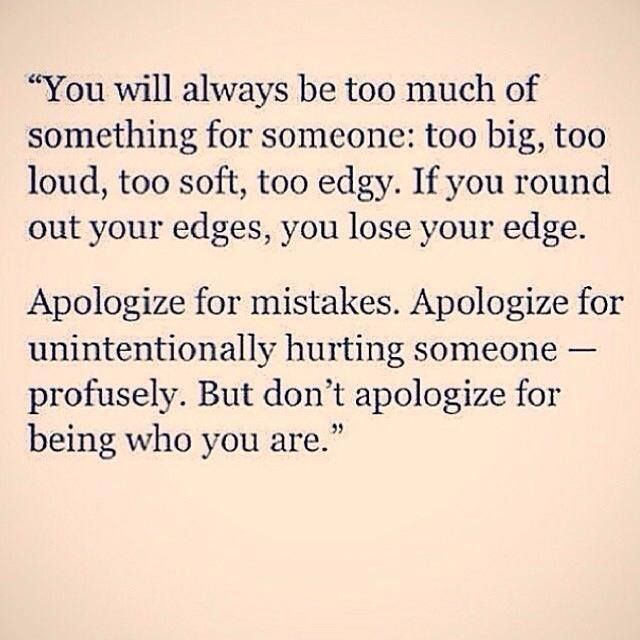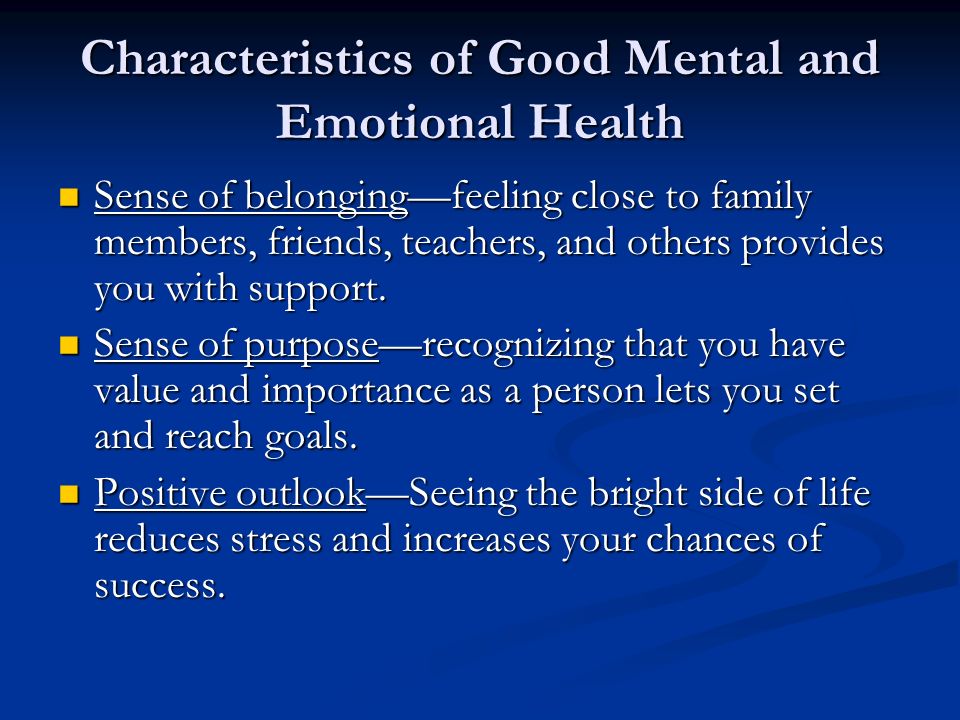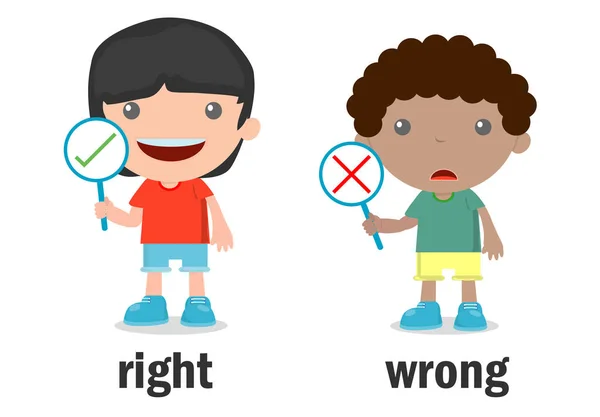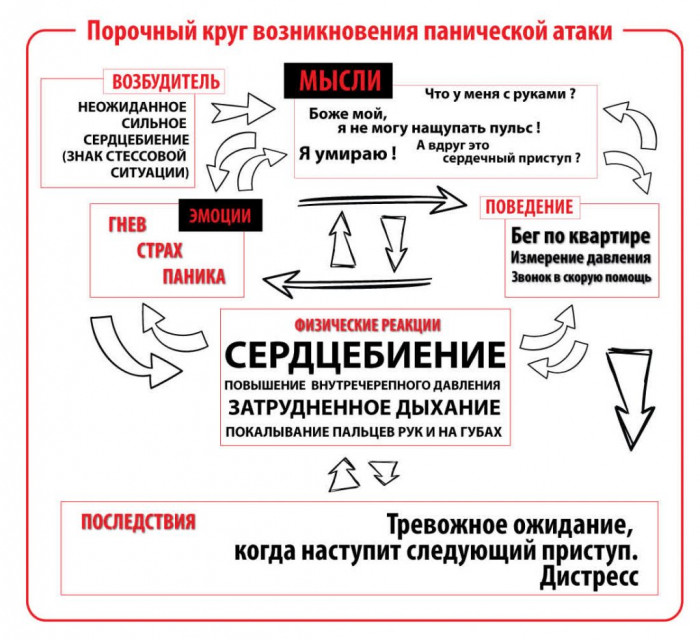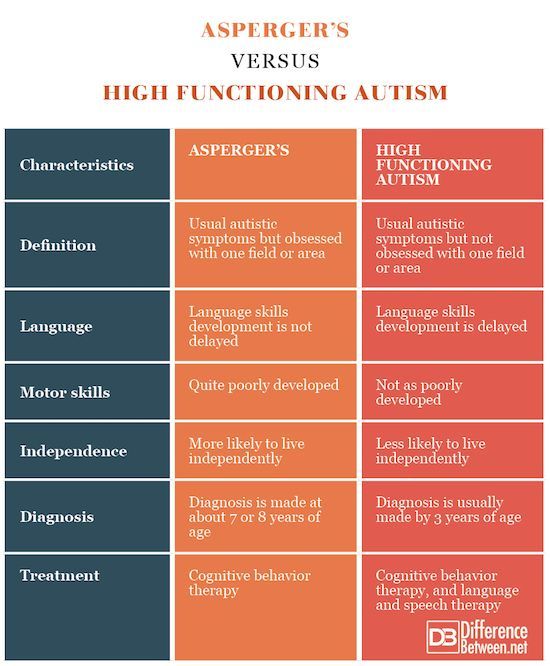Apologizing for hurting someone
How to Apologize to Someone You Hurt
We all make mistakes. They don’t make you a bad person; it only makes you human.
Even though mistakes, mishaps and accidents happen all the time, apologies are still difficult. It’s hard to own up to hurting someone else.
Regardless, apologies are important to maintaining healthy relationships. After hurting someone, an apology can’t undo what happened. Instead, an apology should help mend the relationship so everyone involved can learn and move forward.
Apologies are for both of you. Apologizing will help you grow as a person and let the other person know you care about them and your relationship.
The next time you need to apologize, try structuring your apology by following these five steps to help everyone heal.
1. Understand the Situation
An often overlooked step in the process of apologizing is figuring out what needs to be apologized for. After all, how can you validate the other person’s feelings if you don’t try to see it from their perspective? How can you move forward from this situation if you don’t know what needs to change?
Before you begin your apology, make sure you understand what just happened and what the repercussions might be. This might require you to actively listen to the other person or take a step back and reflect on the situation, actions, and feelings of everyone involved. This isn’t easy to do.
2. Say Sorry
A simple “sorry” likely won’t do the situation justice, but it’s a good start!
A lot of times people need to hear the words “I am sorry” to feel you are making an honest apology. This clear statement of ownership is more genuine than other phrases like “mistakes were made” or “I’m sorry you feel that way” because it does not shift blame or attempt to minimize what happened.
In some situations, being more specific can help communicate that you know exactly what you are apologizing for and be taken genuinely (“I’m sorry for making an insensitive comment about your family” is better than “I’m sorry for whatever I said”).
3. Acknowledge your Actions
Apologies are hard because it means we have to take a good look at ourselves and our actions and admit our wrongs.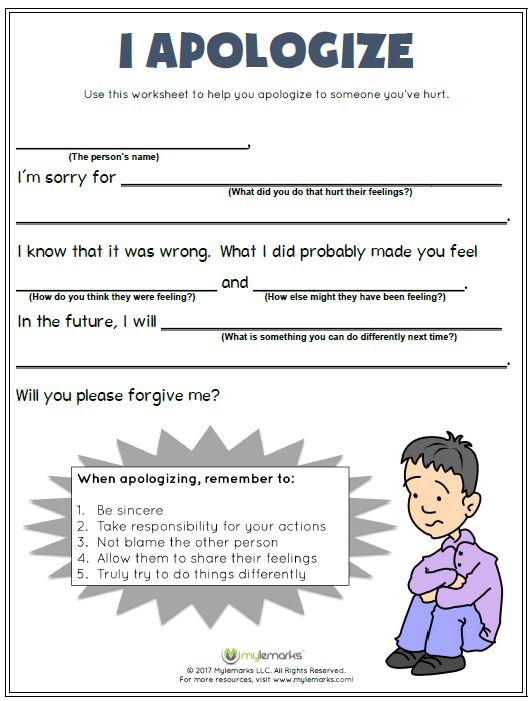 No one likes to be wrong, especially when our error results in hurting someone we care about.
No one likes to be wrong, especially when our error results in hurting someone we care about.
We might feel uncomfortable, awkward, ashamed, or embarrassed. These are very common feelings in situations where an apology is warranted, but it’s a crucial step in moving forward and healing. Shying away from the truth doesn’t protect you and instead damages people’s trust in you, extends conflicts, and holds you back from personal growth.
Be honest with yourself and your loved one(s) and don’t beat around the bush. In some situations, particularly if something was an accident and won’t happen again, giving an explanation of your actions may be appropriate. Be careful to avoid excusing your behaviour (“I’m sorry, but I just…”), and instead only give context if it helps explain your action.
4. Express Remorse
Put yourself in their shoes and think about how you might feel if the situation was reversed.
Validate their feelings. Let them know you understand that you’ve hurt them and that they may feel hurt, neglected, sad, etc.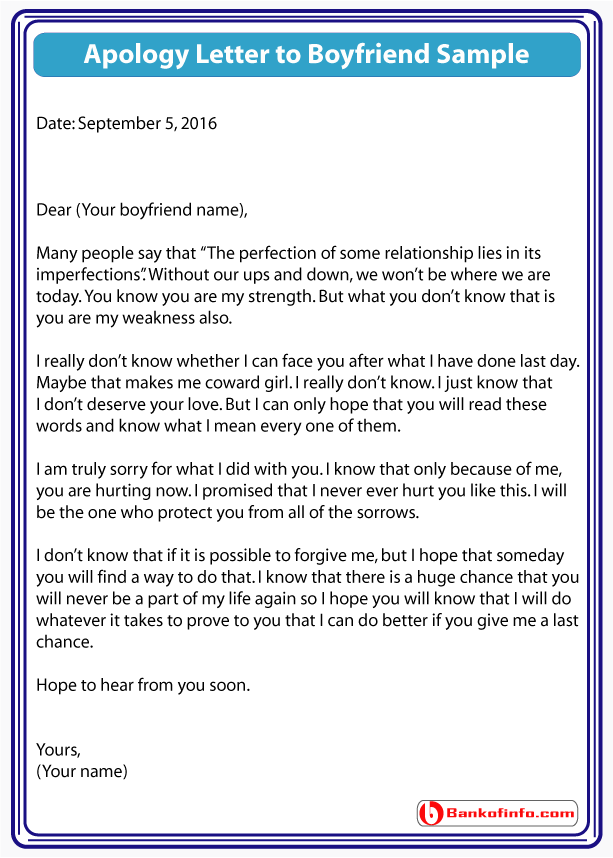 You should let yourself be vulnerable in your shame, remorse, or guilt and express how you regret your actions and the hurt it caused.
You should let yourself be vulnerable in your shame, remorse, or guilt and express how you regret your actions and the hurt it caused.
This is not the time to feel defensive or resentful, as neither emotion will help either of you move on from this. If you are feeling defensive or resentful, it might help to think of the situation as us working together against a conflict rather than a “you vs. them” battle.
5. Make it Right
Now, the crucial step: let them know what you will change and follow through.
Not sure what needs to be changed or have no solutions? Ask them! Asking the person what would be most meaningful for them is a great way to show them that you really care how they feel. This is also helpful to ensure you are on the right path towards healing, rather than taking a course of action that would only relieve yourself of guilt.
If you seem to be having the same argument repeatedly, take a moment to think about how the last conflict was resolved. Was there anything that we said needed to change, but never actually did?
Was there anything that we said needed to change, but never actually did?
The key is holding yourself accountable for the promises made. This demonstrates your commitment to change and genuine regret for your actions.
Example of an apology
The Set-Up:
You come home later than usual after letting off some steam with your coworkers after work and you see that your partner has made dinner and there is a gift on the table. With a sinking feeling in your stomach, you realize today is your anniversary and you have completely forgotten. Your partner is visibly upset, saying your forgetfulness clearly shows you don’t care about them.
1. Understand the Situation
Realizing both of you have emotions running high, you take a moment to think about the situation:
- What happened? You forgot your anniversary and arrived home late while your partner prepared a special dinner.
- How are they feeling? They are feeling hurt, believing you are not putting in effort into your relationship.

- How are you feeling? You initially feel defensive — you care a lot about your partner and their accusation feels dismissive of everything you’ve done. You’ve been swamped with work the past couple of months and the stress has been wearing you down and you’ve been feeling very overwhelmed. While so focused on work deadlines, you realize that you may have been too tired or stressed to spend time with your partner and ultimately forgot your anniversary.
2. Say Sorry
“I’m sorry for forgetting today was our anniversary and for being late to the dinner you made.”
This is clear and specific about what actions hurt your partner.
3. Acknowledge your Actions
“It was wrong of me to forget our anniversary. I’ve been focusing on work a lot lately and I can see that it has been hurting both of us. I realize now that I haven’t spent enough time with you.”
This phrase acknowledges what you’ve been doing wrong both in a larger context of your relationship and this specific situation.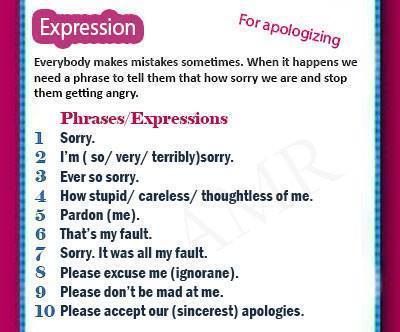 It demonstrates you are taking accountability for your actions and are aware of the bigger picture. An important feature is starting with “I” statements because it places you in the active role rather than merely being a bystander of a bad situation (e.g. “I focused too much on work” vs. “work has been busy”). This communicates to your partner an explanation of your behaviour without excusing it.
It demonstrates you are taking accountability for your actions and are aware of the bigger picture. An important feature is starting with “I” statements because it places you in the active role rather than merely being a bystander of a bad situation (e.g. “I focused too much on work” vs. “work has been busy”). This communicates to your partner an explanation of your behaviour without excusing it.
4. Express Remorse
“I can imagine that my attention always being on work has left you feeling neglected, hurt, and lonely. Plus, I’m sure my short temper and tiredness from feeling overwhelmed with stress have made you feel worse. I feel terrible and embarrassed that you so thoughtfully made a nice dinner and got me a gift for our anniversary, while I forgot all about it. I want to be clear that my forgetfulness doesn’t mean I don’t care for you, because I do”
This shows you’ve empathized with your partner’s feelings, acknowledged the hurt you’ve caused, and are willing to be honest with your feelings of remorse.
5. Make it Right
“What can I do to make this up to you? Moving forward, I want to leave work at work and spend more quality time with you.”
Asking how you can make it up to them shows that you are making an effort to make things right and care about how they feel. Once they’ve given you a direction or action that you can move forward with, be sure to keep your promise.
How to Apologize When You’ve Hurt Someone
After a stressful year when COVID-19 disrupted our lives, nerves are understandably frayed. Whether dealing with pandemic-related difficulties or other concerns, there have probably been instances where you weren’t your best self. You might have some relationships—with relatives, friends, partners, and colleagues—that need healing and reconciliation. This is where figuring out how to apologize comes in handy. No matter who is in the wrong, sometimes nothing soothes animosity faster than saying “I’m sorry,” but screwing up your apology can make things worse.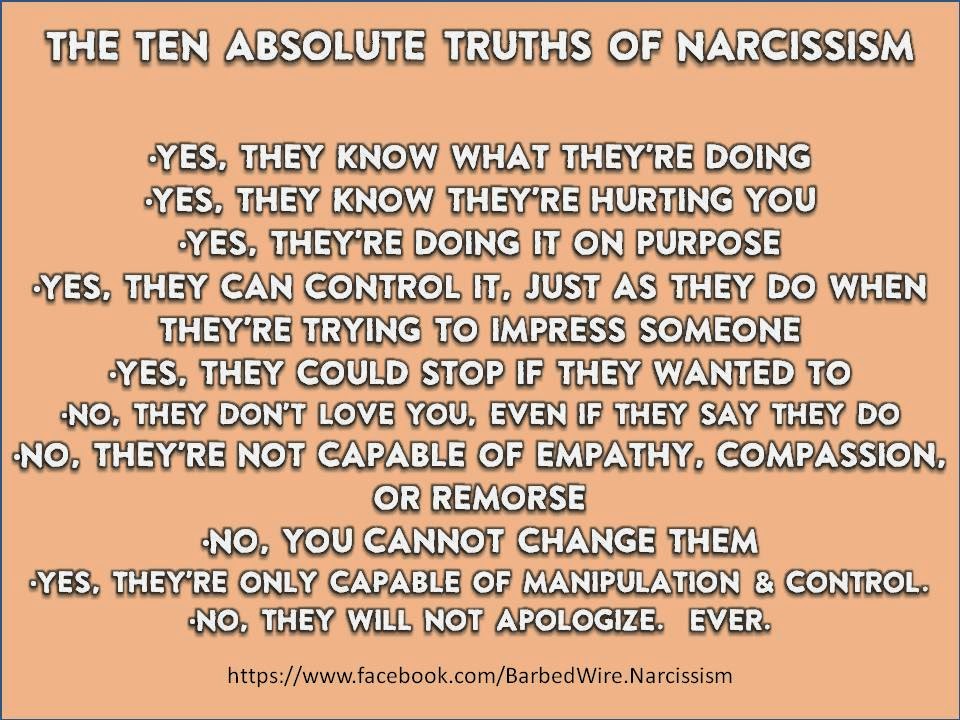
In A Good Apology: Four Steps to Make Things Right, Molly Howes, Ph.D., a clinical psychologist in Boston, delineates the elements of a solid apology. She explains that you should seek to understand the other person’s injury, offer sincere regret, make restitution, and show it’ll never happen again. As you can imagine, it’s easy to falter (especially when hurt feelings or defensiveness are involved). So we’ve asked Dr. Howes and other experts for a few tips to keep in mind when you’re apologizing.
1. Listen closely before rushing to apologize.
Sometimes quick apologies make sense. Say you’re in the market and bump into someone; it doesn’t take much to say “sorry” and help them pick up their groceries. But in more complicated matters, rushing toward an apology can be insincere. So what should you do instead? “First, calmly ask what’s going on to understand how the other person feels,” Dr. Howes tells SELF. “Then shut up and listen, even if it’s uncomfortable. ”
”
Active listening—which involves making eye contact or otherwise making it clear that you’re completely tuned in and really focusing on what they’re saying instead of preparing your rebuttal—helps you truly understand the impact of your missteps. With this insight, you can make your apology more specific, heartfelt, and effective. You can affirm what you’ve heard from the other person and ask clarifying questions as necessary. The attentiveness also helps you keep the same mistake from happening again.
2. Prepare your apology in advance when possible.
Not everyone communicates the same way. If you want forgiveness from someone you offended, whenever possible, connect via their comfort zone, not yours, whether it’s (safely) in person, on the phone, in an epistolary missive, or via Skype, Zoom, FaceTime, or or other multimedia. “If it’s in writing, show the draft to someone you trust before sending,” Vatsal Thakkar, M.D., a Connecticut-based psychiatrist, tells SELF.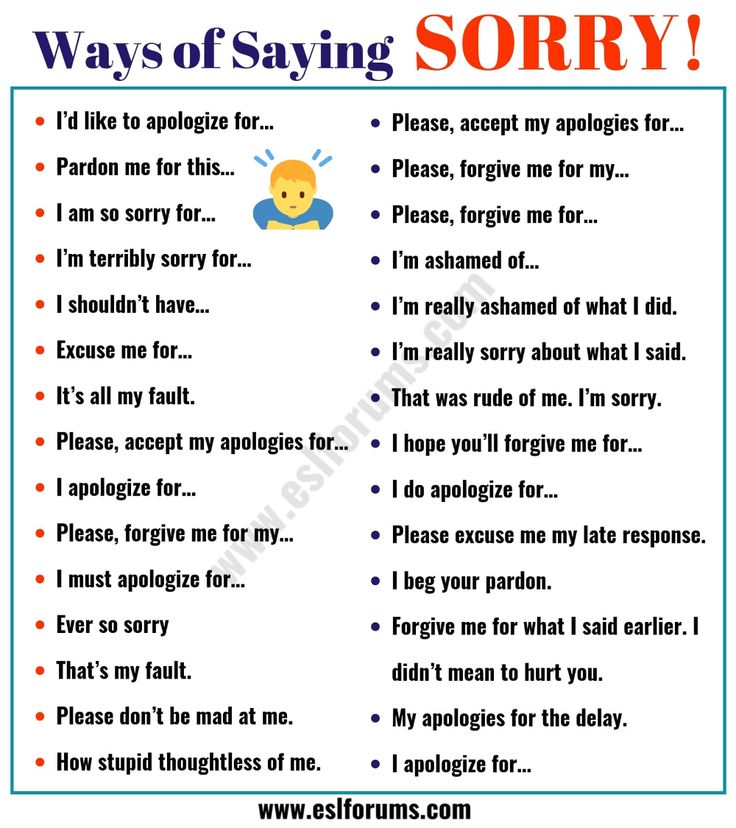 “If it’s in person, write down your apology first to organize your thoughts and get it right.” While forgiveness isn’t guaranteed, this small step can help smooth things over.
“If it’s in person, write down your apology first to organize your thoughts and get it right.” While forgiveness isn’t guaranteed, this small step can help smooth things over.
3. Be specific and detailed in your apology.
The declaration that you’re sorrowful isn't always enough. If someone has taken the time to explain how you’ve hurt them, then you can mirror that vulnerability by expressing your regret, explaining why it happened, and showing how you’ll repair the damage.
After you explain yourself, the key is to emphasize that you understand how you’ve harmed the person (which should be clear if you’ve been listening actively) and then follow up with how you’ll avoid making the same mistake in the future. If, for instance, someone is upset that you haven’t returned their calls, you might say: “I’m sorry I was unresponsive. I was working overtime, but that doesn’t excuse anything. You are important to me, and I understand how my actions caused you pain. In the future, I’ll shoot you a text ASAP to let you know when I’m free to call.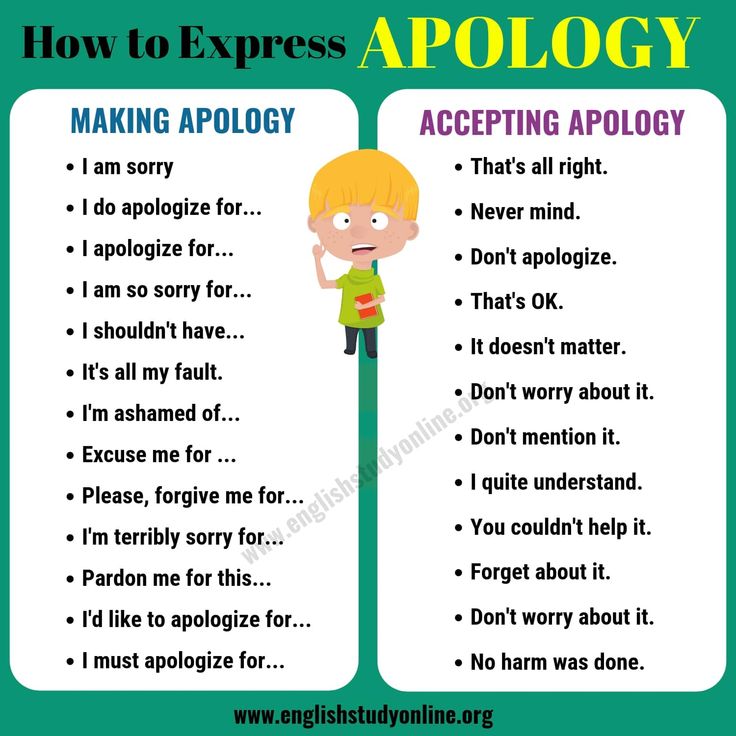 ”
”
Should I wait for an apology?
The Constitutional Court of the Russian Federation received a complaint in which a citizen asked to recognize Part 1 of Art. 136 of the Criminal Procedure Code of the Russian Federation "Compensation for moral damage" to the extent that, according to the meaning given to it by the established law enforcement practice, it serves as a basis for refusing to officially apologize on behalf of the state for the harm caused to a person illegally subjected to measures of procedural coercion in the course of proceedings on a criminal case. nine0003
As follows from the documents attached to the complaint, the court of appeal annulled the decision of the district court to seize the property of a citizen who participated in the criminal case as a victim, recognized as material evidence. The complaint filed by him to recognize as illegal the inaction of the prosecutor, expressed in the failure to make an official apology, was left without satisfaction.
Having studied the case, the Constitutional Court of the Russian Federation noted that the contested article of the Code of Criminal Procedure of the Russian Federation provides for the obligation of the prosecutor on behalf of the state to officially apologize to the rehabilitated person for the harm caused to him as a result of criminal prosecution. At the same time, it is specified in the definition, under rehabilitated, in accordance with paragraph 35 of Art. 5 of the Code of Criminal Procedure of the Russian Federation, is understood as a person who, in accordance with this Code, has the right to compensation for harm caused to him in connection with illegal or unjustified criminal prosecution. nine0003
It is clarified that the norm contested by the applicant is aimed at protecting the rights and legitimate interests of persons illegally or unreasonably subjected to criminal prosecution (determinations of the Constitutional Court of the Russian Federation of June 21, 2011 No. 758-O-O and of November 17, 2011 No. 1552-O -O). The right to compensation for harm to persons illegally subjected to measures of procedural coercion in the course of criminal proceedings is guaranteed by other legal provisions, including Part 3 of Art. 133 of the Code of Criminal Procedure of the Russian Federation, which provides for the right to compensation for property damage, and part 5 of the same article, according to which, in other cases, issues related to compensation for damage are resolved in civil proceedings. nine0003
758-O-O and of November 17, 2011 No. 1552-O -O). The right to compensation for harm to persons illegally subjected to measures of procedural coercion in the course of criminal proceedings is guaranteed by other legal provisions, including Part 3 of Art. 133 of the Code of Criminal Procedure of the Russian Federation, which provides for the right to compensation for property damage, and part 5 of the same article, according to which, in other cases, issues related to compensation for damage are resolved in civil proceedings. nine0003
The Constitutional Court of the Russian Federation also referred to the Decree of the Plenum of the Supreme Court of the Russian Federation dated November 29, 2011 No. 17, which emphasizes that individuals not listed in Part 2 of Art. 133 of the Code of Criminal Procedure of the Russian Federation, illegally subjected to measures of procedural coercion in the course of criminal proceedings, as well as legal entities that were harmed by illegal actions (inaction) and decisions of the court, prosecutor, investigator, interrogator, body of inquiry in the course of criminal proceedings, are not classified criminal procedure law to the circle of persons entitled to rehabilitation; however, in the event of harm to these persons, they have the right to compensation in the manner prescribed by Ch. 18 Code of Criminal Procedure of the Russian Federation. nine0003
18 Code of Criminal Procedure of the Russian Federation. nine0003
In view of the foregoing, the Constitutional Court of the Russian Federation did not find grounds for accepting this complaint for consideration.
According to Konstantin Kuzminykh, lawyer of the Admiralteyskaya CA of St. Petersburg, rehabilitation should be understood as the restoration of not only material rights, but also the lost good name. “As a general rule, criminal prosecution infringes on the rights of suspects or accused, i.e. the persons against whom it is carried out. But it is not uncommon for cases when serious damage, and not only material, is inflicted by the criminal prosecution body on other persons. Suffice it to recall the practice of searches in firms, at enterprises where the investigation is actively looking for certain documents, temporarily blocking their work and in parallel causing damage to their reputation,” he explained. nine0003
The expert gave an example from his own practice, when a trainee lawyer who had nothing to do with the case under investigation was detained at the tax authority.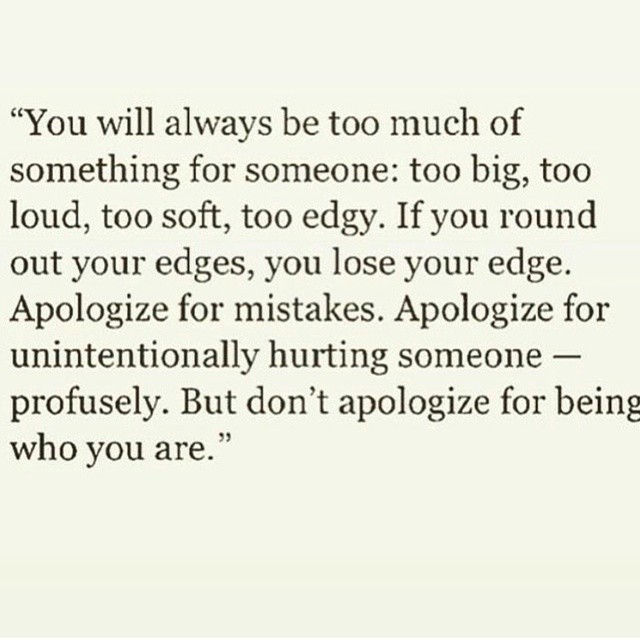 He was forcibly taken to the investigator, his passport and phone were taken away, and he was forced to testify as a witness - in general, Konstantin Kuzminykh emphasized, law enforcement officers behaved unacceptably from a procedural and ethical point of view for more than six hours. “I am sure that after the trial in accordance with Art. 125 of the Code of Criminal Procedure of the Russian Federation, police officials will not make any apologies, even if the court satisfies the complaint. At best, they will execute the court’s decision to issue a copy of the seizure protocol or return the phone,” the lawyer added. nine0003
He was forcibly taken to the investigator, his passport and phone were taken away, and he was forced to testify as a witness - in general, Konstantin Kuzminykh emphasized, law enforcement officers behaved unacceptably from a procedural and ethical point of view for more than six hours. “I am sure that after the trial in accordance with Art. 125 of the Code of Criminal Procedure of the Russian Federation, police officials will not make any apologies, even if the court satisfies the complaint. At best, they will execute the court’s decision to issue a copy of the seizure protocol or return the phone,” the lawyer added. nine0003
Konstantin Kuzminykh pointed out that the wording of Art. 133 of the Code of Criminal Procedure of the Russian Federation states: persons are not classified as rehabilitated, while Art. 136 of the Code of Criminal Procedure of the Russian Federation speaks of the obligation of the prosecutor to apologize only to the rehabilitated. “The Constitutional Court of the Russian Federation, in my opinion, in this case did not use the possibility of another, different from the literal understanding of Art. 133 and 136 of the Code of Criminal Procedure of the Russian Federation, interpretations and by such a decision supported the existing attitude towards those who suffered from criminal proceedings, having nothing to do with the subject of this proceedings, ”he concluded. nine0003
133 and 136 of the Code of Criminal Procedure of the Russian Federation, interpretations and by such a decision supported the existing attitude towards those who suffered from criminal proceedings, having nothing to do with the subject of this proceedings, ”he concluded. nine0003
At the same time, Filipp Bagryansky, Deputy Managing Partner at Bagryansky, Mikhailov and Ovchinnikov, believes that the very idea of obliging a prosecutor to apologize to someone is debatable. “Apologizing is not a legal category, but rather a moral one. They should be offered sincerely, and not under duress, and be the result of repentance, not coercion. At the moment, apologies are formal and ritual in nature, and prosecutors bring them, as a rule, only because they are obliged to do so by law, and not because they regret something. An insincere apology is always hypocrisy. Why force someone to hypocrisy?” - emphasized the lawyer. nine0003
psychotherapist's advice • Articles on the website of the BOMBORA publishing house
“After a mistake, many of us automatically say “forgive me”.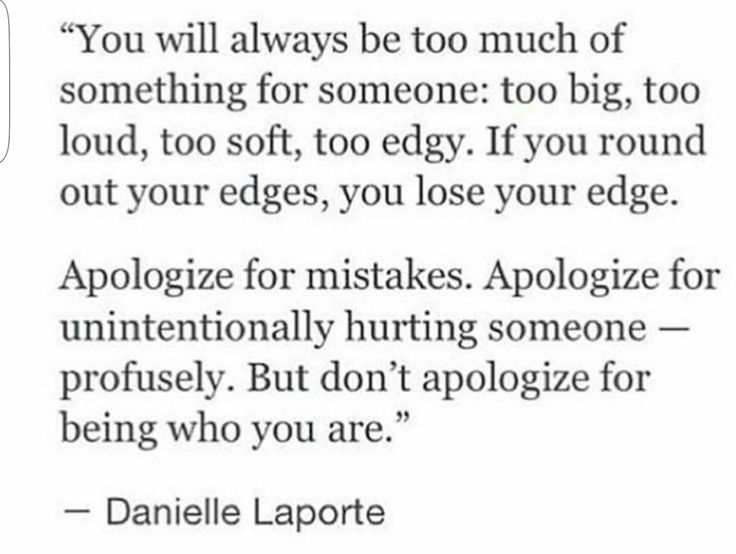 But even if these words were uttered in a sincere attempt to build a relationship, they are often not enough, ”says psychotherapist Molly Howes. Over thirty years of work, Howes developed her own methodology for a quality apology and shared it in the book No Offenses. We share four Howes steps that will teach you how to apologize so that you always forgive. nine0003
But even if these words were uttered in a sincere attempt to build a relationship, they are often not enough, ”says psychotherapist Molly Howes. Over thirty years of work, Howes developed her own methodology for a quality apology and shared it in the book No Offenses. We share four Howes steps that will teach you how to apologize so that you always forgive. nine0003
Step 1. Do nothing, just be there
The first step is to listen carefully and understand the other person's feelings. If you ask for forgiveness without understanding the cause of the offense, you can apologize for something other than what we are really to blame for. Since we often do not know the experience of other people and do not see our own mistakes, these same people should point them out to us. It's like driving: we can't get rid of the blind spot, but as responsible drivers we have to keep it in mind at all times. nine0003
We do not need to change our minds about ourselves in order to listen to someone else's vision of our actions. You don't even need to believe that we really did harm. But you need to fully focus on the other person while discussing how you influenced him. Hear about his pain.
You don't even need to believe that we really did harm. But you need to fully focus on the other person while discussing how you influenced him. Hear about his pain.
Often apologetics interrupt this step with defensive maneuvers, trying to justify themselves or devalue the other's complaint. It is difficult to remain silent when someone describes our actions in such a way that they seem unfair or inaccurate. However, at this stage we must not counterattack. Only listen. nine0003
Phrases to help:
“I thought I knew what happened, but I must have missed something. Explain me please?"
"I offended you greatly, and I sincerely want to understand what my fault is."
"I want to understand and will do my best to just listen."
The next steps will also require patience, humility and courage. But when we take the first step, we create momentum. Healing has already begun.
Step 2. Be sincere
In the second step, we must show that we understand how the other person suffered, that we care about it. This is the time to show that we take responsibility for the harm done to others. Even if it wasn't intentional. It is important to remember that it is the other person, not us. The essence of the second step is empathy for the victim, not atonement for sins, and the apology should focus only on the feelings of the interlocutor.
This is the time to show that we take responsibility for the harm done to others. Even if it wasn't intentional. It is important to remember that it is the other person, not us. The essence of the second step is empathy for the victim, not atonement for sins, and the apology should focus only on the feelings of the interlocutor.
Phrases to help:
“I'm sorry that I drank too much / argued / arrived late / neglected a serious occasion and ruined such an important day for you. I have no excuse." nine0003
“It's my fault that I didn't foresee everything. I'm sorry".
“I should have realized how much this means to you. I'm so sorry you had to go through this alone."
One must speak sincerely and to the point. Ornate statements distract from the most important thought: we are aware of responsibility and regret. If we have been able to express sympathy and sincere regret, we are already halfway to forgiveness.
Step 3. Make amends
The main question for the third step is: what can compensate for pain or injustice? What compensation can restore the disturbed balance? nine0003
In personal relationships, "compensations" are usually not material.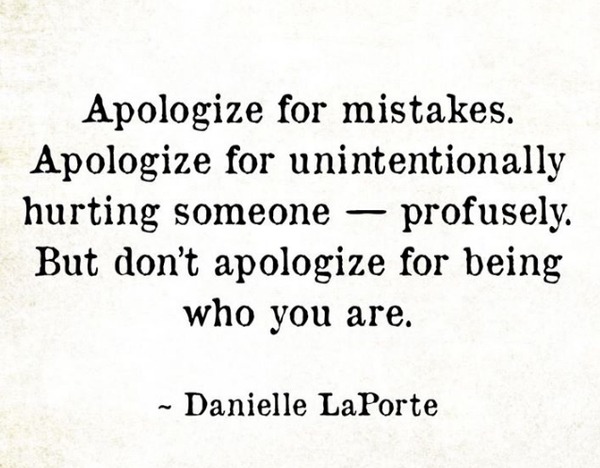 It may seem that compensation is not applicable here, but it is not. For example, if someone is wrongly accused, a true story can be made public as compensation, and this will correct the misunderstanding. Another example: if we forgot about the anniversary, it's time to organize a new holiday.
It may seem that compensation is not applicable here, but it is not. For example, if someone is wrongly accused, a true story can be made public as compensation, and this will correct the misunderstanding. Another example: if we forgot about the anniversary, it's time to organize a new holiday.
The main thing is to make sure that the compensation is equivalent to the pain caused and generally acceptable to the person. That is, you need to “compensate” in the language of your opponent. nine0003
Phrases to help:
“I want to help you calm down. I have a couple of ideas. Maybe discuss them?
"What can I do to ease the pain my mistake has brought you?"
"What can help you trust me again?"
Go to the last step.
Step 4: Never Again
Just because we apologized and made amends, you can't be sure it won't happen again. The offended side is often wary of repetition. Can people really move on if this same situation can ruin everything again? Is it true that all grievances are forgotten if the causes of pain still exist? Step four is the one most often overlooked by apologetics.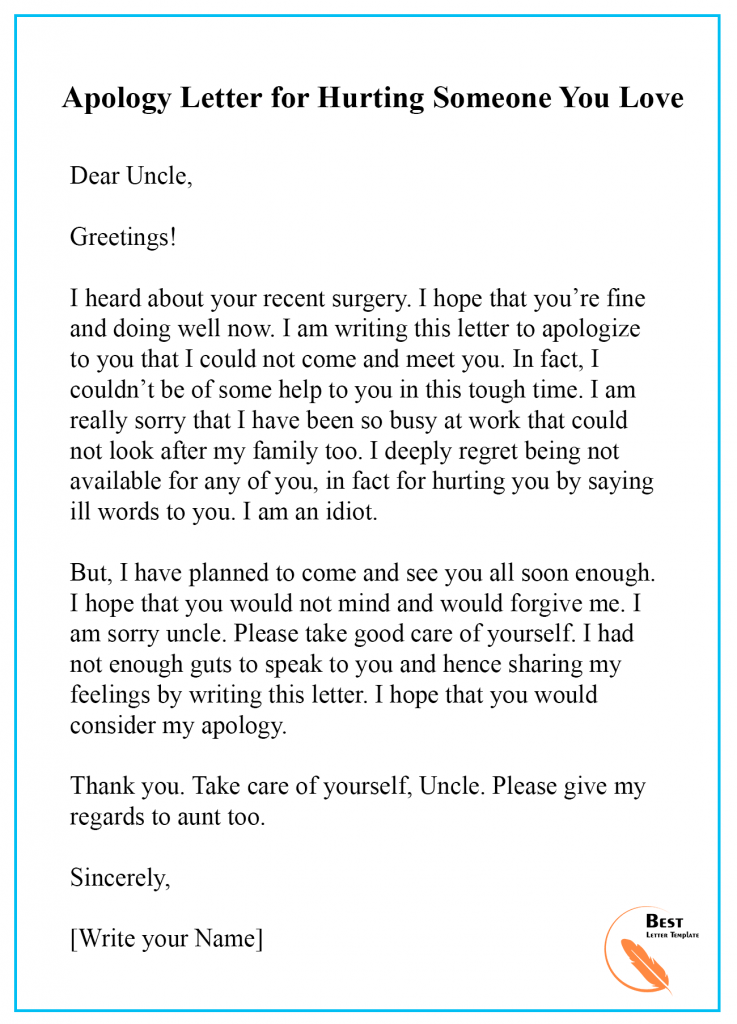 But it is in it that all the important results are hidden. nine0003
But it is in it that all the important results are hidden. nine0003
Its essence is to accept obligations that will not allow you to step on the same rake. In practice, this means: better understand the roots of your defensive reactions and their triggers, identify self-destructive or harmful behavior, change habits. This often requires some form of soul searching or greater self-awareness, sometimes the help of a psychologist.
Phrases to help:
"Here's what I'll do to make sure this never happens again."
"I want to do my best to earn your trust again" nine0003
"Please tell me if you see us slipping back into the old style of communication."
Why apologize and why it is sometimes so difficult. How to ask for forgiveness and correct in the most neglected cases. When you don't have to apologize. Clear answers to these and other questions, as well as understandable recommendations from a psychologist, are in the book “No offense.